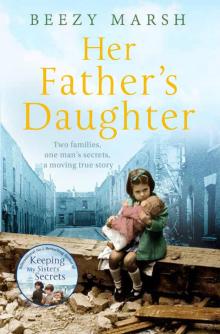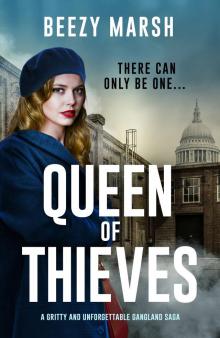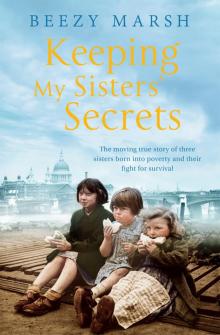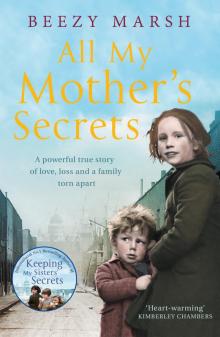- Home
- Beezy Marsh
All My Mother's Secrets Page 5
All My Mother's Secrets Read online
Page 5
Jack the errand boy grabbed Annie and kissed her on the cheek. He was a good year younger than her but it still made her blush. ‘Oh, you should have seen them up on the High Street, Annie!’ he cried. ‘There’s people hanging off the buses and the trams and they’re selling flags and people are singing.’
Annie looked back into the wash house and saw one figure, dressed all in black, still determinedly scrubbing away at her washboard. It was Bessie.
‘Come on, Bessie,’ said Annie, gently, walking towards her. ‘Everyone’s going for a knees-up! It’s the end of the war and Jack said there’s flags and everything.’ It sounded pathetic once she’d said it, but she was desperate for Bessie to come along.
Bessie looked up at her, and Annie could see that there were tears in her eyes. ‘I won’t be buying no flags, Annie,’ she said. ‘I ain’t got anything much to celebrate. But you run along now.’
The church bells at All Saints started to ring out, pealing the news far and wide.
Jack stuck his head around the wash house door. ‘Come on, Annie! Esther and the others are waiting for you.’
‘Go, on,’ said Bessie, with a weak smile. ‘Go and enjoy yourself. I’ll mind the laundry and keep the Missus happy.’
Annie found herself swept along with all the laundresses and laundrymen, as London’s Washtub came out to raise a glass to the end of four long years of fighting. She wasn’t sure how many laundries there were in Soapsud Island but there must have been dozens because every corner they turned brought another crowd of jubilant people, smiling and laughing in a way Annie had never seen before. She should have been happy, but she couldn’t get the thought of Bessie out of her head, all alone and grieving for her son, lost at the Western Front. And there was something else; she tried to push it to the back of her mind, but she knew that if the war hadn’t happened her life would have been very different. She’d have a father. Her real father would be here in Acton with her.
By the time they reached the pub, the hurdy-gurdy man was there. He pushed his barrel organ on top of a pram, on account of his limp, and Annie noticed that, despite the party atmosphere, the laundrymen turned their backs on him when he arrived.
Jack emerged from the pub with two bottles of ginger beer and handed one to Annie.
‘He’s that coward who shot himself in the foot, ain’t he?’ he said.
The hurdy-gurdy man was still wearing the blue flannel suit and red tie he was given by the soldiers’ hospital up in Edmonton where his foot was treated, but the suit was filthy now and he wore a patched greatcoat over it, against the cold.
Annie shrugged her shoulders. She’d heard that rumour too, but by the time the hurdy-gurdy man got home, his missus had gone off with a fella from the munitions factory in any case, and now he was left with just his blind mother for company. Could anyone blame him for trying to get back from the trenches? If Bessie’s son had done that, would everyone hate him too? Perhaps they would, but at least Bessie wouldn’t be alone and still working in the laundry while the rest of London had a party.
The hurdy-gurdy man doffed his cap and started working his way around the crowd outside the pub, asking for pennies to play a tune. A woman who was all hips under her laundry apron, with barely a tooth in her head, earned a few cheers by jeering at him: ‘Why dontcha play “I’ve Got a Blighty One”, then? ’Cos you’ll know all about that.’
She did a funny little jig and hopped on one foot as she sang: ‘When I think about me dugout, where I dare not stick me mug out, I’m glad I’ve got a bit of a Blighty one.’ A few of the rough women from around Stirling Road cackled with laughter but he ignored them and started to turn the handle of the barrel organ and it played ‘It’s a Long Way to Tipperary’, the notes chiming out across the late afternoon air.
Some of the laundry women relented and chucked a few pennies in the hat and started singing along: ‘. . . it’s a long way to go. It’s a long way to Tipperary, and the sweetest girl I know . . .’ and before anyone knew what was happening, the whole pub seemed to have joined in.
The laundrymaids linked arms in two lines across the street and started moving towards each other and away again, tapping as they went. A few started some kicks and Vera lifted the hem of her apron with a whoop: ‘Me dad’s beaten the Hun! He’s coming home!’
The two lines set a rhythm, forwards and back, forwards and back. Vera pointedly refused to link arms with Esther, so Annie went over and joined in, allowing Esther to link on the end of the line beside her.
‘Farewell, Piccadilly, goodbye Leicester Square . . .’
Annie danced but her feet felt like lead. She was dancing on her father’s grave, every step on the cobbles pounding his bones deeper into the mud. The mud in those trenches was terrible. She knew that because she’d overheard Bessie and some of the ironers talking about it when their boys came home on leave. Some of them never came home to Acton again after that, poor souls. Poor souls, because they died going ‘over the top, boys’.
The war was over, but her father was never coming home.
5
May 1919
The laundry was full to bursting with whites in the run-up to Empire Day.
The Missus at Hope Cottage had taken in extra work from the streets of Soapsud Island, so that every little girl who needed a pristine dress to dance around the maypole in would have one. It was a constant source of wonder to Annie that families like hers, which struggled even to put shoes on their kids’ feet, could find the money for such pretty frocks. Her mum and the other women made sure they paid into the boot club at the laundry at a penny a week to save for shoes. But expensive dresses seemed to appear as if by magic on such occasions, and they were always sent to be washed and pressed so that they were sparkling white.
Mothers might go hungry and the drapers up on the High Street would be owed a few quid, but the little girls always had something nice to dance in. It was a shame on a family not to dress up the children and be spotlessly clean. Everyone knew who the grubby kids without a nice frock were and no one wanted to be seen with them as they tagged along at the back of the procession. Mostly, their mothers would stay indoors anyway, so they didn’t have to see people pointing and staring. Annie didn’t like to get involved in all that tittle-tattle, but it was just the way things were.
Nanny Chick had sewed up a little dress for Ivy, altering of one of Annie’s old petticoats. It had some nice lace on the bottom and that had been pressed into service to make a bit of detail for the hem and the cuffs, which was pretty. She was such an easy baby, sturdy as anything, just like Bill, and she seemed to shrug off coughs and colds with a wave of her chubby little hand. She slept like a log, tucked up in the fruit crate at the foot of Annie and George’s single bed. Mum said having her was just like shelling peas; she was back at her ironing board barely a fortnight after giving birth, just as the Missus had hoped. There had been a scare, of course, with the terrible flu that winter. Mum made sure that Ivy didn’t even leave the house when it was at its worst, even though it meant Nanny Chick was climbing the walls having the baby under her feet all day.
Nanny Chick wasn’t managing as well as she used to, but Mum didn’t want to put the baby in the nursery that the council had built on Bollo Bridge Road, which some of the other laundresses put their babies in, and so Annie had to stay off work too. ‘A few of those poor little mites got the flu and now their poor mothers are grieving,’ said Mum, her hands wringing the edges of her apron. ‘I can’t risk her catching it, Annie. And if the Missus complains, then she’ll have to deal with me,’ she said. She kept George off school too and so Annie had to play endless games of hide and seek under the table in the scullery with him and Ivy to keep them entertained.
As it was, the Missus herself was laid up in bed for two weeks, saying she was dying. She wasn’t, of course; she had the constitution of an elephant, but when Easter arrived she was still bending Bill’s ear about the terrible night sweats she’d suffered and the aches all over her body
, so bad she knew how our good Lord Jesus must have felt.
Then the first blossom started to appear on the trees and the nights began to get lighter. The whole neighbourhood seemed alive with the excitement of the impending Empire Day parade. Annie smiled to herself on the way home from work in the evening as she overheard the little girls from down her street making up songs about their new dresses as they played with a skipping rope, which they stretched from one side of the road to the other, calling on each other to ‘jump in’. Their brothers were too busy building carts out of bits of wood and old pram wheels to care, of course, and some poked sticks at each other, like pretend rifles. It was six months since the guns had fallen silent at the end of the Great War, and with so many injured soldiers home, it was going to be a Peace Day celebration with a brass band too, helping to raise some money for the local hospital.
Annie wouldn’t have a new white dress for Empire Day, of course. She was too old for that now, as a working girl, and she was content just to be involved in helping to get everyone else looking spick and span. But she was hoping the Missus would give her an hour or so off in the afternoon to join in the celebrations.
Every spare scrap of material was being pressed into service to make fancy dress costumes for the children the length of Fletcher Road. Mothers knocked on each other’s doors when they ran short of thread or needed a bit of ribbon for trimmings. George had been picked to dance around the maypole with some of the other children from Rothschild Road School and he would have to wear a perfect blue and white sailor suit; he wasn’t very happy about that. George wanted to be a little soldier, and so to keep the peace at home Bill had carved him a gun in the back yard, with much cursing about splinters in his fingers. But he did George proud with it and George now spent all his time marching around the house, the wooden gun slung over his shoulder, pleased as Punch.
Annie couldn’t help but notice that her little brother’s cough was as bad as ever, despite it almost being summer. And when Nanny Chick came to make him a pair of white shorts from one of Bill’s old shirts, she had to take the waist in twice.
Annie took them with her to the laundry to be starched, with his sailor suit top. Its collar was the colour of a robin’s egg, a beautiful pale blue, and Mum would make sure George looked handsome by pressing it just right.
Starching clothes took ages, but Annie preferred it to washing. The Missus had her own recipe for starching and Annie had learned it off by heart. For the trimmings: half a tablespoon of starch, a quarter teaspoon of lard, half a cup of cold water and one teaspoon of borax and a quarter of a pint of boiling water. The lard really made the clothes shine. For the body of the clothes she was to use five tablespoons of starch, so the petticoats would be nice and stiff. The mixture had to be stirred with the cold water first and Annie slowly added boiling water, stirring constantly, to remove any lumps. The starch had to be cooked on the stove for half an hour and then strained. She’d add more water with Dolly Blue to the mix, to bring out the whiteness of the clothes. Annie had to put the starch on the dresses while it was still hot and rub it in with her fingers; it came out looking a bit like jelly but it was so warm that it sometimes burned her. She wiped off any excess with a clean, damp cloth.
The little white dresses were hung to dry and then dampened again, ready for ironing, each one rolled up and placed neatly in a wicker basket to go upstairs. Annie was just picking up the next load to take up to the ironing room when the Missus came running into the wash house.
‘I’ve lost another one of my best pressers to that new power laundry in Packington Road,’ she cried. ‘That ungrateful wretch. I saw her and her daughter through the war and this is how she repays me. It’s all “steam power” this and “gas iron” that these days. Well, she won’t know how to work any of it, and I shan’t have her back!’
She looked around at the assembled washerwomen and laundrymaids, who had stopped scrubbing and starching. There were two patches of high colour on Mrs Blythe’s cheeks as she stood, with her hands on her hips, shouting to the whole room: ‘Don’t any of you lot even think about leaving! I won’t stand for it. Now, Annie, stop gawping, girl, and get those dresses upstairs.
‘Esther and Vera, you go with her. You know how to iron, don’t you?’
Bessie harrumphed to herself and got back to her washboard; she had no intention of going anywhere – better the devil you know, that was her motto. The laundrymaids nodded and traipsed after Mrs Blythe. The youngsters from the packing room, who were still on sweeping-up and laundry-marking duties, found themselves shunted into the wash house to help Bessie, who clucked round them like a mother hen.
Vera whispered to Annie on the way up the stairs: ‘I heard the pressers at that new place, Miss Toomey’s, are getting six shillings a day for ironing! And they get proper breaks an’ all.’
‘The rules are they can only work fifty-four hours a week too,’ said Esther, turning around on the top step to join in the gossip. ‘Sounds like a dream.’
‘I wasn’t talking to you!’ Vera cut in. ‘Mind your own beeswax, Esther.’
Poor Esther looked away and trudged off into the ironing room. Vera was still so mean to her; Annie couldn’t see the point of it. The war was over.
‘But my mum only gets six shillings and sixpence a day and she’s the top ironer,’ Annie whispered, in case the Missus overheard – she wouldn’t have her girls discussing wages. ‘It can’t be true.’
‘Well, I heard it is true, so there!’ said Vera, with a note of triumph in her voice. ‘Might think of going there myself!’ She tossed her blonde curls over her shoulders. As she did so, Annie couldn’t help but notice some bruises on the side of Vera’s neck. They looked like finger marks.
Mum appeared in the doorway. ‘Now, girls, you know I won’t have idle chatting. Come along.’ She wasn’t a big woman like the Missus but she didn’t need to raise her voice to them because she just had a way about her, a way that made you listen.
‘Sorry, Mrs Pett,’ they chorused.
It seemed strange calling her Mrs Pett instead of Mum but that was the rule when Annie was at work; she wasn’t treated any differently from the other laundrymaids. In any case, she wasn’t a Pett, she was an Austin and so was George. It was a small comfort to her that she didn’t share Bill’s name, even if he did rule the roost.
Annie plonked the wicker basket down by the ironing board. The rough pressers would usually be working on sheets, napkins and pillowslips, but today everyone had been promoted to the role of best presser to get the Empire Day dresses done. Aunt Clara and Dora from the packing room were working away at the centre table, along with another two women, each taking a corner of the table to iron on. Annie spotted that Aunt Clara was ironing George’s little sailor suit. She worked so quickly and then it was on to the next piece. All the women were paid per piece and seemed to work at lightning speed with searing-hot irons. Annie didn’t think she’d ever be as good as that.
‘Right, girls,’ said Emma. ‘Get a dress each and unroll it, please.’
Emma, Vera and Esther found a space each on the long ironing board under the window and carefully unrolled a white dress each. Some had delicate lace trims while others had embroidered panels down the front. They were all beautiful. Annie had never worn anything like this when she was little, but she felt a sense of pride at being able to make other people look nice.
‘First, you girls will watch me and then you can start on your own dresses,’ said Mum.
She doused the dress with lavender water and pulled it, inside out, over the bosom board attached to either end of the long ironing board – this was a small board, about half the width of the other one, and perfect for getting the front and the back of the dress smooth. She picked up one of the plain, heavy ‘sad’ irons from the stove and held it an inch away from her face to test the heat. ‘You see, girls, it ain’t burning me, so it ain’t going to burn the frock.’ She pressed the yoke, the front panel and the waist, before moving down to th
e skirt. ‘Once you have done the body you can get it off the bosom board and move down the line, so we all have a bit of space.’ Emma then turned the dress so that the embroidery on the front was facing the right way out. She dampened it and then covered it with a clean white cloth before choosing one of the smaller, lighter, polishing irons.
‘Now, girls, remember to iron straight across the embroidered bit, rather than going around it in a circle, because that will only make the middle puff up,’ she said. ‘If you need to, you can help each other out. One of you can hold the dress straight while the other one irons it. The same goes for lacework. It is delicate, so go gently, and you need to damp that down a fair bit before you start pressing.’
Vera rolled her eyes. It was clear that she didn’t want Esther helping her out. She shook out the dress she was going to work on and stalked off to the pagoda stove to get an iron.
Annie pulled the dress she was working on over the bosom board, as Esther whispered, ‘I don’t know what’s got into Vera, lately.’
‘Just ignore her,’ said Annie. ‘She’s just in one of her moods.’
Vera positioned herself at the end of the long ironing board, as far away from Esther as possible, and started pressing briskly.
When she was finished with the bosom board, she shifted along and Esther put her frock on the board, inside out.
The Missus came into the room and Aunt Clara made the mistake of wondering, out loud, how much she’d earned this week with all the extra dresses she’d pressed. The Missus shot her a filthy look and tutted in her general direction before bustling over to Mum.
‘I don’t know what I’m going to do, Em,’ she confided. ‘It’s getting harder to find decent workers and if I take any more young’uns on, it’s going to look more like a blooming schoolroom in here than a laundry.’
Annie and Esther exchanged glances and suppressed a fit of giggles. To cover up their laughing, they nipped over to the shelf by the sorting rack, pretending they had run out of lavender water and needed to refill their shakers.

 Her Father's Daughter
Her Father's Daughter Queen of Thieves
Queen of Thieves Keeping My Sister's Secrets
Keeping My Sister's Secrets All My Mother's Secrets
All My Mother's Secrets